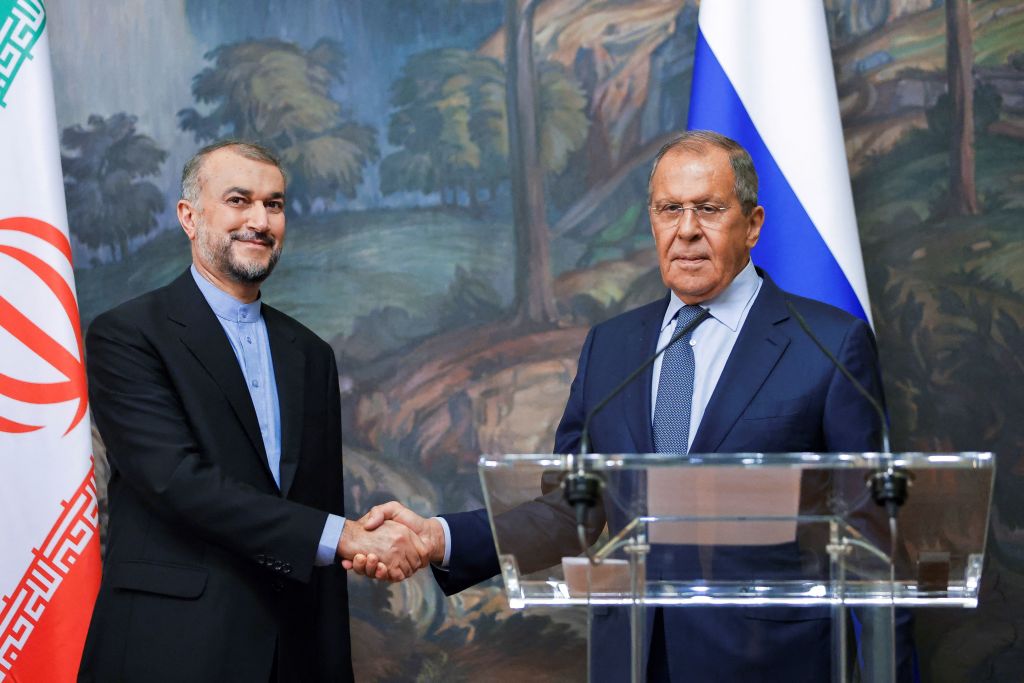The Russian military, burning through munition stockpiles unsustainably in Ukraine, has found an eager new supplier of drones and missiles. Arms transfers from Iran are boosting Russia’s faltering effort, but the sales’ second-order effects are a boon to the Islamic Republic’s malign objectives as well.
Despite Tehran’s claims of neutrality, Iranian weapons first made their way to the Ukrainian battlefield months ago. Russian forces are using surveillance and “kamikaze” drones, which crash into their targets and explode on impact, according to reports in Western and Russia-friendly media. The drones are relatively unsophisticated but reliable and can evade Ukrainian air defenses when deployed in great numbers.
Russian President Vladimir Putin has used the new weapons to terrorize Ukrainian civilians and attack energy infrastructure. Russian aerial attacks have killed more than 70 people since October 7, and Ukrainians are suffering nationwide blackouts after drone and missile strikes rendered nearly one-third of the country’s power stations unusable.
Yet the effects of Iran’s support will reverberate far beyond Eastern Europe.
The high-dollar arms transfers extend the Islamic Republic a monetary lifeline as negotiations to lift Western sanctions on its nuclear program are falling apart. They also open the door to future sales: Moscow has reportedly ordered Iranian-made ballistic missiles and long-range drones to replace its exhausted supply of precision-guided munitions.
Iran’s Islamic Revolutionary Guards Corps (IRGC) would also benefit from more access to advanced Russian weaponry. The prospect of such an arrangement grows as Moscow’s increased diplomatic and economic isolation cause it to reconsider previously dubious deals. The head of Iran’s Air Force confirmed a bid to purchase Russian-made Sukhoi Su-35 fighter jets only weeks after the first Iranian drones appeared in Ukraine.
For years Iran and its proxy forces have terrorized U.S. and allied forces in the Middle East, but deploying Iranian weapons to Ukraine means it can test those armanents against Western defenses on a new scale and battlefield.
“They will be able to watch their weapons tested against a highly capable military force using Western technology and tactics,” said Norman Roule, a former Middle East expert at the CIA. “Iranian officials observing this conflict and their drones, and perhaps missiles, in action, will return with lessons that they likely apply elsewhere in the Middle East.”
And with IRGC specialists reportedly instructing Russian forces on the ground in Crimea, they could even have a shot at capturing and reverse-engineering Western military technology.
All this “will make the Iranian systems better, which in turn will help the Iranians to be able to build an offensive weapon that would threaten Israel and the Middle East,” Ukrainian Foreign Minister Dmytro Kuleba argued Tuesday in a request for Israeli air defense systems. But Israeli Defense Minister Benny Gantz Wednesday rejected the bid for the weaponry, citing “a variety of operational considerations.”
Rather than solely try to outmatch Iranian tech on the battlefield, the Biden administration is aiming to prevent the weapons from arriving at all. The Treasury Department leveled new sanctions against several Iranian nationals and companies for their roles in developing and transporting the weaponry last month. But the administration has more options available, particularly with the prospect of Iran’s formidable missile arsenal joining the fight.
“You can’t just go after the individuals and entities involved in the transfer of these drones. You’ve gotta go after the major financial institutions that are involved in paying for it. And that means going after Russian and Iranian banks,” said Mark Dubowitz, CEO of the Foundation for Defense of Democracies. “The administration really needs to step it up, otherwise these transfers are going to happen and they’re going to happen in greater number and greater lethality.”







Please note that we at The Dispatch hold ourselves, our work, and our commenters to a higher standard than other places on the internet. We welcome comments that foster genuine debate or discussion—including comments critical of us or our work—but responses that include ad hominem attacks on fellow Dispatch members or are intended to stoke fear and anger may be moderated.
With your membership, you only have the ability to comment on The Morning Dispatch articles. Consider upgrading to join the conversation everywhere.